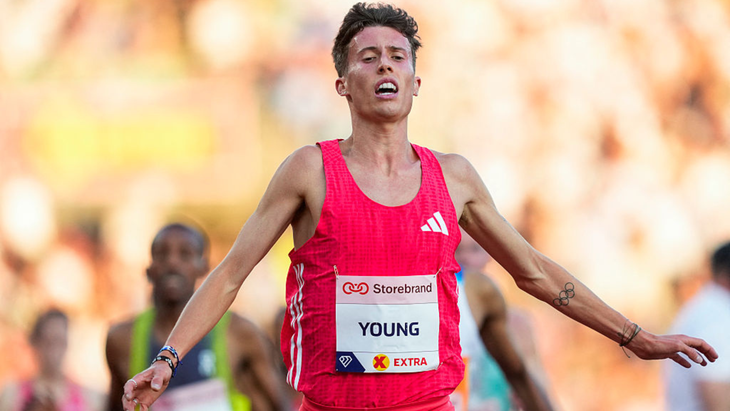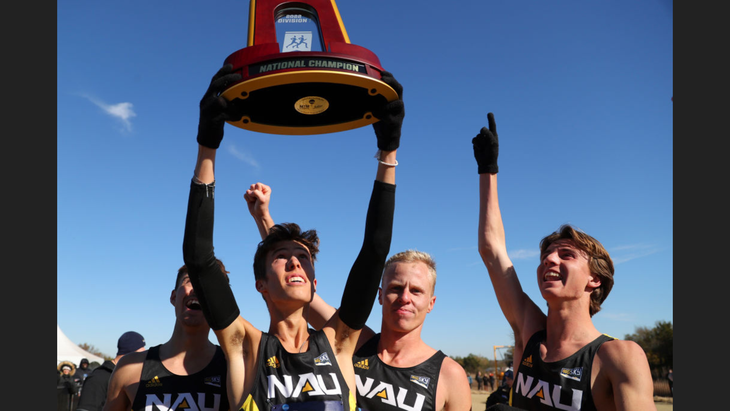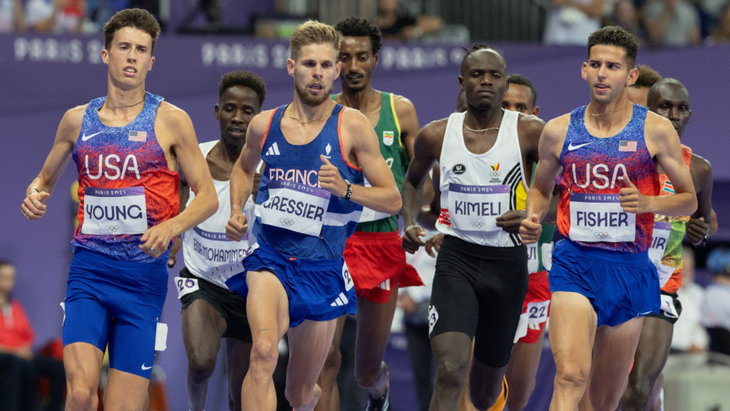New perk: Easily find new routes and hidden gems, upcoming running events, and more near you. Your weekly Local Running Newsletter has everything you need to lace up! Subscribe today.
At only 22 years old, American runner Nico Young has already been a prominent name in the sport for what feels like an eternity. He first rose to national attention in high school, setting multiple American records as part of the famed Newbury Park, California, track and cross country team—alongside his younger twin brothers, Lex and Leo, who now compete for Stanford. He continued his rise as a multiple NCAA champion and collegiate record holder (10,000 meters outdoors and 5,000 meters indoors) at Northern Arizona University (NAU).
Just weeks after competing in his final collegiate meet, Young out-kicked Drew Hunter to snag third place in the 10,000 meters and punch his ticket to the 2024 Paris Olympics, where he placed 12th.
Earlier this month, Young made yet another leap with a powerful statement on the global professional stage by winning the men’s outdoor 5,000 meters at the Oslo Diamond League meet—setting a new American record of 12:45.27—more than a second faster than the previous mark of 12:46.96, set in 2022 by Olympic medalist Grant Fisher.
Now, Young aspires to make Team USA for the second time and eyes a potential World Championships medal in Tokyo this September, Young caught up with from his home base in Flagstaff, Arizona, to talk about his breakthrough season, his transition to professional running, how he stays grounded amid the hype, and what’s next.

Outside RUN: Nico, first of all—congrats on the American record. Was that something you had been targeting for a while? When you stepped on the line, was that the goal?
Nico Young: Thank you! Yeah, going into that race, I had talked to my coach [Mike Smith], and he thought I could run somewhere between 12:42 and 12:46. Just hearing those numbers was wild. I wasn’t totally sure how it would go, or how it would feel coming through the 3,000m mark in 7:42 [editor’s note: that’s 4:07 per mile]. But in the weeks leading up to it, my training pointed in that direction, and I knew there was a definite possibility I could run something like that.
What was your reaction when you saw those numbers on the board?
I was thrilled. Yeah, I mean, it’s such a competitive field, and the caliber of those athletes in that race is crazy. To get the win and get the record was a great step and bodes well for the rest of the season.
Was there something different you did in training or lifestyle that’s made a difference in your performance?
For sure. A big factor has been not having the constraints of the NCAA season anymore. I can now pick and choose my races, and that’s allowed for more focused, extended training blocks. Going into Oslo and [Diamond League] Paris a week later, I had solid uninterrupted training, which really helped me feel ready and really good at this point of the season.
How’s the transition to full-time professional running? Has it matched your expectations?
It’s been awesome. Getting to travel around the world for races is amazing. I visited a lot of places on this recent Europe trip that I hadn’t seen before, so it’s all pretty exciting. But Flagstaff, Arizona will remain my home base.
You’ve been successful at every level—high school, college, and now pro. How have you stayed so sharp mentally through it all?
NY: We all have tough races and moments when it feels like the goals we’ve set might not come to fruition. But whenever I have a race like that, a tough workout, or an injury that sets me back, I always come back to my goals, the people around me who support me, and the question of how I can get better. It’s about making it to the next starting line healthy, ready to compete, and willing to try again.

What about handling the hype or pressure attached to being a phenom and having success at such a young age, especially with social media?
There have definitely been times when that’s been difficult, especially when media sites put up things that can make a race seem like something bigger than it actually is. But I’ve never really been someone who reads the comment sections or feeds into the hype from those outlets and what they project onto the sport.
I stay centered by focusing on what I’m going to do in the race. A race can go in any direction, and I know I’m going to do my best regardless. That’s going to say a lot more than anything people are saying online.
That’s such good advice—especially for younger athletes, who really look up to you. What’s your advice to them about managing expectations?
I think it’s really easy in our sport to tie things like a race outcome, a time, or the desire to be the top finisher on your team to your identity or sense of belonging.
Something I constantly remind myself—and something I remind my younger brothers, former teammates, and family—is that that’s not true. At the end of the day, it might just be a race. It doesn’t necessarily define how successful you are or who you are as a person.
That’s the main message I try to share with other athletes. I think it helps them stay focused on what they need to do during the race, rather than stressing over what might happen or what the result could mean. It takes some of that pressure off.
Do you have any mental cues or techniques that help you get through tough moments in races?
Well, I will say, for the race in Oslo, I was really nervous going into it. I didn’t even realize how nervous I was until I got to the starting line. And throughout the race—because the pace was so fast—there were plenty of moments when I felt like checking out, stepping off the pace, or hesitating to make a move when I needed to.
In those moments, I focused on physical cues—relaxing my shoulders, relaxing my face—and mentally reminding myself, “We’re not at the end of the race yet.” I just tried to stay calm, trust myself, and make the moves that felt right in the moment. That’s how I ground myself in situations like that.
What motivates you most at this stage of your career? Is it chasing records, medals, or something else?
I really just want to see how good I can get. Chasing records definitely excites me. I’d love to battle for medals at the highest level. Those are the kinds of goals I have in mind—and the work I’m doing now is all about putting myself in a position to achieve them.

Do you have role models in the sport—past or present—that you look up to?
Grant Fisher is someone I really respect. I looked up to Galen Rupp a lot growing up, and it’s cool that he’s now coached by my college coach. Also, being around guys like Bryce Hopple and Hobbs Kessler in Flagstaff has been great. We’re close in age and friends. Their training is quite different from mine, but we enjoy hanging out with each other for sure.
Looking ahead in your career—any interest in competing in the marathon someday, or do you see yourself sticking to the track and (relatively) shorter distances?
I’ve definitely thought about it, and I think the marathon could be fun eventually. But right now, I love the track and want to stay here as long as I can. Who knows what might happen down the line though.
Finally, what’s next for you this season?
NY: My next focus is the U.S. Championships at Hayward Field in early August. I have big goals for that meet. And then it’s onto Worlds. Looking ahead, maybe even some cross-country next fall—it’s really competitive on the pro scene, but it would be cool to do that again.